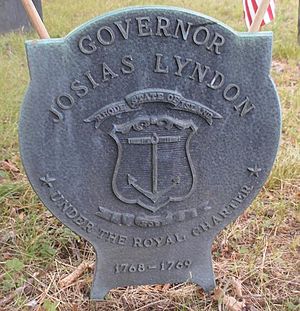Josias Lyndon facts for kids
Quick facts for kids
Josias Lyndon
|
|
|---|---|

Josias Lyndon grave medallion
|
|
| 35th Governor of the Colony of Rhode Island and Providence Plantations | |
| In office 1768–1769 |
|
| Preceded by | Stephen Hopkins |
| Succeeded by | Joseph Wanton |
| Personal details | |
| Born | March 10, 1704 Newport, Rhode Island, U.S. |
| Died | March 30, 1778 (aged 74) Warren, Rhode Island, U.S. |
| Resting place | Kickemuit Cemetery Warren, Rhode Island, U.S. |
| Spouse |
Mary Carr
(m. 1727) |
| Occupation | Scrivener, Clerk of Assembly, governor |
Josias Lyndon (born March 10, 1704 – died March 30, 1778) was an important leader in the early American colonies. He served as the governor of the Colony of Rhode Island and Providence Plantations for one year.
Contents
Josias Lyndon's Life and Work
Josias Lyndon was born in Newport, Rhode Island. His family had been in the area for a long time. In 1727, he married Mary Carr. She was the granddaughter of another governor, Caleb Carr. Josias and Mary did not have any children.
In 1728, Josias became a "freeman" of Newport. This meant he had the right to vote and take part in local government. He had a good education from the Newport Grammar School. He became a scrivener, which is like a professional writer or copyist.
Working for the Colony
In the same year, 1728, Josias Lyndon started working as the Clerk of the Assembly. The Assembly was the main law-making group for the colony. He kept this job for almost 40 years, until 1767. He was very good at his job. He knew almost every law and official paper written during that time.
After being governor, he went back to being the Clerk. He worked in this role again from 1770 until 1777, just before he passed away.
Becoming Governor
In 1768, Josias Lyndon was chosen as governor. At that time, there was a big disagreement between two powerful leaders, Samuel Ward and Stephen Hopkins. Both had been governors many times.
Because of this rivalry, Josias Lyndon was chosen as a "compromise candidate." This meant he was someone everyone could agree on. He was elected almost without anyone voting against him.
His Time as Governor
Most of Josias Lyndon's year as governor was spent writing letters. He wrote to a representative of the King of England. These letters were about the colonists' worries over unfair taxes. One of these taxes was called the Stamp Act.
He exchanged many letters with the Colonial Secretary in London. They discussed the colony's rights. The main task during his time as governor was to figure out how much the Rhode Island colony was worth. This amount was a little over two million pounds.
Later Years and Death
When the American Revolutionary War started, Newport was taken over by British soldiers. Josias Lyndon moved to Warren, Rhode Island, to be safe. He died there in 1778 from smallpox, a serious disease. He was buried in a cemetery in Warren.
Caesar Lyndon: A Remarkable Man
Caesar Lyndon was an African man who was enslaved by Josias Lyndon. He was very smart and could read and write well. Caesar helped Josias Lyndon with his business. He worked as a purchasing agent, buying things, and also as a secretary.
Caesar's Account Book
Caesar kept a special book called his Sundry Account Book. In this book, he wrote down all his money dealings. He recorded sales and purchases from slave traders in Newport. He also wrote about money exchanges with both free and enslaved people.
This book shows how Caesar managed his money. He wrote down details like deaths, marriages, and even a pig roast! This nearly 35-page book is a fascinating example of early writings by African Americans in the United States.
Community Leader
Caesar Lyndon was also a secretary for the Free African Union Society. This was the first Black benevolent society in the United States. A benevolent society is a group that helps its members and the community.
Caesar earned extra money on the side. With this money, he bought nice clothes and belt buckles. He even paid for weekend trips for himself and his friends. In the summer of 1766, Caesar and some friends had a "pleasant outing" to Portsmouth, Rhode Island. He prepared a big meal for his guests, including roasted pig, corn, bread, wine, rum, coffee, and butter. Two months later, Caesar married Sarah Searing, who had been with him on the picnic.
 | John T. Biggers |
 | Thomas Blackshear |
 | Mark Bradford |
 | Beverly Buchanan |

